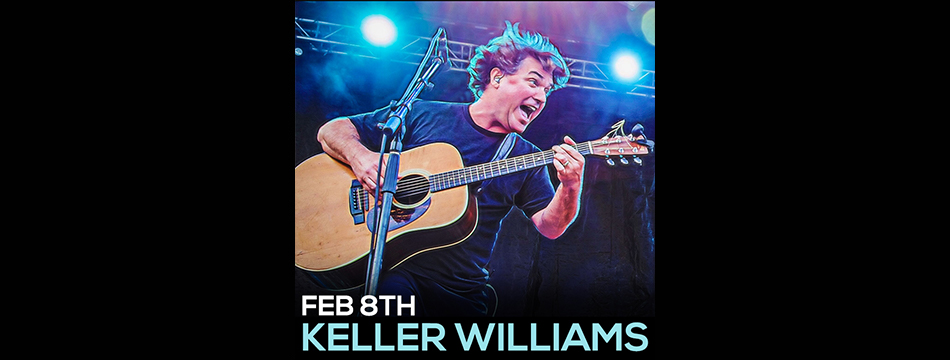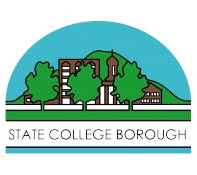

Keller Williams
February 8, 2020 @ 8:00 pm
| $28.50 – $34.50Keller Williams released his first album in 1994, FREEK, and has since given each of his albums a single syllable title: BUZZ, SPUN, BREATHE, LOOP, LAUGH, HOME, DANCE, STAGE, GRASS, DREAM, TWELVE, LIVE, ODD, THIEF, KIDS, BASS, PICK, FUNK, VAPE, SYNC, RAW, SANS and Add, those who have followed his career will know this. Each title serves as a concise summation of the concept guiding each project. GRASS, for example, is a bluegrass recording cut with the husband-wife duo The Keels. STAGE is a live album, and DREAM is the realization of Keller’s wish to collaborate with some of his musical heroes. THIEF is a set of unexpected cover songs, KIDS offers Keller’s first children’s record, PICK presents Keller’s collaboration with royal bluegrass family The Travelin’ McCoury’s, and RAW is a solo acoustic album. Each album showcases Keller’s comprehensive and diverse musical endeavors and functions to provide another piece of the jigsaw puzzle that is Keller Williams. Keller’s collaborative and solo albums reflect his pursuit to create music that sounds like nothing else. Unbeholden to conventionalism, he seamlessly crosses genre boundaries. The end product is astounding and novel music that encompasses rock, jazz, funk and bluegrass, and always keeps the audience on their feet.
Since he first appeared on the scene in the early ’90s, Williams has defined the term independent artist. And his recordings tell only half the story. Keller built his reputation initially on his engaging live performances, no two of which are ever alike. For most of his career he has performed solo. His stage shows are rooted around Keller singing his compositions and choice cover songs, while accompanying himself on acoustic guitar. With the use of today’s technology, Keller creates samples on the fly in front of the audience, a technique called live phrase sampling or looping, with nothing pre-recorded. The end result often leans toward a hybrid of alternative folk and groovy electronica, a genre Keller jokingly calls “acoustic dance music” or ADM.”
Williams’ solo live shows—and his ability to improvise to his determinedly quirky tunes despite the absence of an actual band—quickly became the stuff of legend, and his audience grew exponentially when word spread about this exciting, unpredictable performer. Once he began releasing recordings, starting with 1994’s FREEK, Williams was embraced by an even wider community of music fans, particularly the jam band crowd. While his live gigs have largely been solo affairs, Williams has nearly always used his albums as a forum for collaborations with fellow musicians. An alliance with The String Cheese Incident on 1999’s BREATHE marked Williams’ first release on the band’s label SCI Fidelity Records, DREAM, Keller’s 2007 release, found him in the company of such iconic musicians as the Grateful Dead’s Bob Weir, banjo master Béla Fleck, bass great Victor Wooten, American musician/poet Michael Franti and many others.
Williams’ story begins in Fredericksburg, Virginia, just south of Washington, D.C. There he was exposed to a wide variety of music at an early age, starting with country and bluegrass and working his way up through hip-hop and go-go, a brand of funk particular to that part of the country. Once he began playing guitar, Williams’ sphere expanded to what he calls “the post-pseudo-skateboarder punk-rock rebellious type of thing, Black Flag and Sex Pistols and Ramones, Dead Kennedys, things like that. That slid into the more melodic college rock, like the Cure and the Cult, the Smiths, R.E.M.’s first five or six records.”
Then came the Grateful Dead, a seminal influence on Williams’ own music. “I studied and learned their music and went to the shows,” he says, adding that the impact of Jerry Garcia on his attitude toward music remains incalculable. Another major influence was Michael Hedges, the late virtuoso acoustic guitarist. “He was really excelling in a whole different world from what I knew,” says Williams.
After relocating to Colorado, further exposure to bluegrass music and progressive acoustic artists such as Béla Fleck and the Flecktones also had a major impression on Williams. As he began to develop his own distinctive compositional and performing style, Williams incorporated all of the lessons he’d learned from the long list of artists who’d found their way into his world, then filtered their music through his own experiences until something wholly unique emerged. The list of artists whose music he has covered either in concert or on his recordings constitutes a mind-blowing spread: songs originally performed by everyone from Pink Floyd and Ozzy Osbourne to Ani DiFranco and old-school rappers the Sugar Hill Gang!
What Williams calls “the looping thing” is actually a big part of what has made him such a compelling live performer. “Basically, I have these machines that are essentially delay units,” he explains. “What I do is step on a button and sing or play something. Then I step on the same button in time and it repeats what I just played or sang. Once that initial loop is created, I can layer on a bass line or a drum line and then have this layer that I just created in front of an audience that I could sing over and solo over. Nothing is pre-recorded. Everything is created onstage in front of the audience.”
If it sounds complicated, it is: but the basic thrust is that the technology has allowed Williams to go out on tour week after week, year after year, and play music by himself—without limiting his sound to what we most often associate with the solo singer-songwriter: a guy strumming a guitar and singing. With his arsenal of tech toys, Williams can expand his reach onstage by, in essence, jamming with himself.
Williams is set to release his 25th studio album, SPEED, in the Fall of 2019, which sees him reunited with his Bluegrass outfit, Keller & The Keels, as they reinterpret popular songs by celebrated artists including The Doors, Kacey Musgraves, Fiona Apple, Weezer and more. SPEED is the trio’s third collaboration together and features a combination of originals and covers, performed in their trademark psychedelic Appalachian bluegrass style. Once again showcasing Williams’ masterful penchant for collaboration and innovation, SPEED proves he’s not planning to slow down any time soon.






